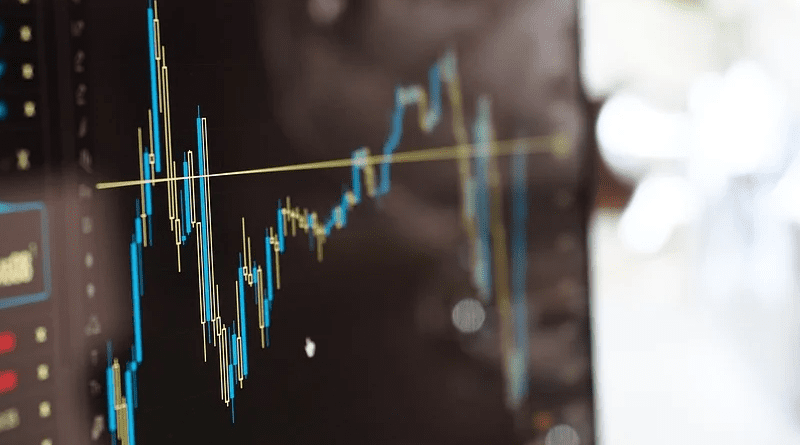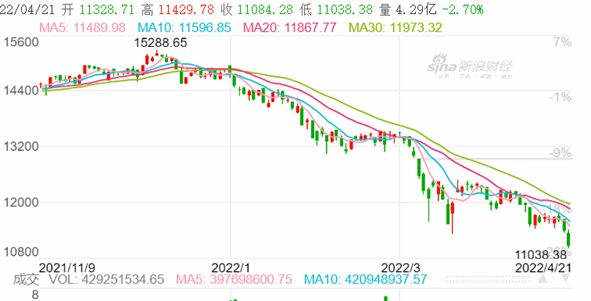What Are Market Anticipations And Policy Expectations As Shares Tumble? – Analysis
By Anbound
By Wei Hongxu*
On April 21st, the three major A-shares indices saw a severe drop due to a combination of local and global causes. The Shanghai Composite Index dropped 2.26%, the Shenzhen Component Index dropped 2.7%, the ChiNext Index dropped 2.17%, and the CSI 300 Index dropped 1.84%. More than 4,400 stocks fell in both cities, while industrial categories led by tourism, fertilizer, agriculture, and photovoltaics almost across the board.
As April started, the Shanghai Composite Index has fallen 7.5%, down 10.5% from the beginning of March. The CSI 300 Index has dropped 13.40% from 4,614 in early March to the current 3,995.83, which tumbled 21.31% from 5,078 in mid-December last year. Because incremental funds were not injected into the market anymore, only stock funds were up for grab. Since the middle of March, A-shares stock trading has been declining, indicating a lack of investor trust.
Researchers at ANBOUND believe that this demonstrates the market’s pessimism about the future economic situation. With the downward pressure on the economy increasing, market confidence restoration and expectations stabilization are critical to helping in the healthy development of the capital market, as well as important in maintaining growth and averting risks.
Figure 1: The Shenzhen Component Index plunging more than 4,200 in the past 4 months
Market institutions have generally accepted the several factors that have caused the recent severe falls in the stock market. First, the worldwide geopolitical risk of distorting the supply chain and affecting company earnings is rather high. Second, since the Federal Reserve has escalated monetary tightening, the quick reduction of the interest rate gap between China and the U.S., as well as the inversion of the RMB exchange rate, is driving the RMB exchange rate to alter, raising concerns about capital flows. Next, the resurgence of the domestic pandemic has a substantial negative influence on China’s economy, particularly in consumption and real estate as indicated in the first-quarter economic statistics, which has heightened concerns about the country’s macroeconomy. Finally, the pessimism has been accentuated by a substantial disparity between recent central bank macro policy actions and market policy expectations. As a result, as long as present internal and external concerns persist, the A-shares market is unlikely to improve much in the immediate term.
Figure 2: The Shanghai Composite Index shedding more than 600 in the past 4 months
Historically, the fluctuations and transformation of China’s stock market couldn’t fully reflect China’s overall economic situation. However, in terms of expectations, the shifting trend of the A-share market, by acting as a barometer of the economy, continues to illustrate the genuine expectations of capital market investors on future business and overall economic developments. As observed in the March market trend, changes in external variables have been absorbed, but recent stock market volatility is more likely to be aggravated by changes in internal elements. As a result, changes in China’s economic circumstances and policy expectations are undoubtedly the cause of the stock market’s dramatic volatility. Investors are increasingly concerned about the negative economic impact of the COVID-19 outbreaks, as well as a lack of trust in the stability of present economic strength and the rhythm of macroeconomic measures that sustain the economy. As things stand, despite the continued implementation of measures and policies aimed at stabilizing the capital market, these policies are insufficient to boost market confidence.
The pandemic and policy declarations are not only harming the capital market but are also major variables influencing China’s economic future. Notably, the recurrence of COVID-19 is concentrated in those economically developed regions such as the Yangtze River Delta and the Pearl River Delta. The scope and depth of its economic impact may surpass that of the outbreak in Wuhan in 2020. In such a case, we believe that there is a demand to put dedicated unconventional policies into place. In this regard, it is necessary to implement targeted measures to stabilize economic fundamentals based on strengthening prevention and control. On the other hand, it is also essential to promote systematic easing among macro policies to avoid the catastrophic consequences caused by shrinking demand.
Since the beginning of the year, in the framework of the Chinese central bank’s monetary policy implementation process, it has taken a cautious approach to progressively easing, which is far from the policy expectation. Although the central bank has maintained “reasonably ample liquidity” as a whole, the reality of the domestic economy indicates the private economy and a large number of small and medium-sized enterprises are unable to obtain sufficient credit support from those “accurate liquidity provisions”. Such economic structural difference requires not only targeted structural reforms, but also overall easing to achieve the dredging effect from “loose money” to “loose credit”, which would reverse the passive situation. Zhang Jun of Morgan Stanley Securities also pointed out that the policy-level “fueling tactics” will cause a waste of policy space and may also deepen the risk to diminish the expectations.
Concerning the present external limitations that limit China’s domestic measures, ANBOUND has previously stated that variables such as interest rate spreads produced by economic and policy disparities are only one of the external factors impacting China’s economy, but not the most important one. Further concern should now be given to the fundamental factors that drive economic growth and structural improvement. In terms of policy, it is imperative to enhance the ‘autonomy’ of macro policies. We should occupy this window, fundamentally reverse the economic trend, and assist the capital market to construct stable market expectations and policy expectations before the international situation undergoes further evolution, hence coping with a better response to the changes in external factors.
It would be difficult to reverse the situation after market expectations have shifted. When combined with a self-reinforcing impact, it frequently leads to a downward spiral vicious cycle in the capital market and the actual economy. Hence, it is hard to reverse market expectations without stable policy expectations. Judging from the economic data of the first quarter, the overall economy is still resilient and possesses a stable foundation. However, to achieve the economic growth target of the current year, it is still necessary to strengthen the implementation of macro policies. This is not only conducive to the stability of the capital market but for the overall economy as well.
*Wei Hongxu, A researcher at ANBOUND, graduated from the School of Mathematics at Peking University and has a PhD in economics from the University of Birmingham, UK



